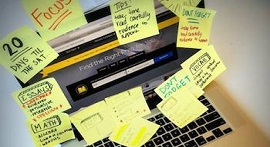Welcome to the University of Redlands. For more than 100 years, we have been preparing students for lives of meaning, impact, and joy through immersive, personalized, and professional education.
As a private, nonprofit university centrally located near the beaches, mountains, and desert in the heart of Southern California, we offer more than 40 undergraduate programs and more than 30 graduate programs in business, education, theology, communication sciences and disorders, geographic information systems, music, sustainability, and public policy.
With the integration of Woodbury University in Burbank, Calif., we will offer additional programs such as animation, architecture, filmmaking, and game, fashion, and interior design.
With more than 80 student-led organizations that span academic, culturally focused, social justice, faith-based, service, arts, Greek, and recreational activities, as well as 21 Division III athletic programs and an e-sports program, Redlands students are involved and invested in a connected and welcoming community.
About
From the School
Contact & Visit
Campus Visits Contact
Visiting Coordinator
P.O. Box 3080
Redlands, CA 92373-9999
Experience College Life
Peppers Art Center
Currier Gymnasium/Fitness Center
Chapel
Post Office
Other popular places on campus: Math and Physics Building, Aquatic Center, Football Stadium, Jasper's Corner, and Plaza Cafe.
Palm Springs/Desert Hot Springs
Mountain Resorts: Forest Falls,Big Bear,Arrowhead
Beaches
Downtown Redlands
There are also several amusement parks (Disneyland, Magic Mountain, Raging Waters, Knotts Berry Farm) within driving distance.
Campus Tours
Mon-Fri, 8:30am-5pm; Sat 10am-2pm
(909) 748-8074
Dates: Year-round
Times: Mon-Fri 10a, 1p and 4p and Sat 11a and 1p
Average Length: 1 hour
On Campus Interview
Faculty and Coach Visits
Class Visits
Overnight Dorm Stays
Transportation
Admissions
Admissions
Overall
From The School
The University of Redlands welcomes, educates, and empowers a diverse community of learners for a life of meaning, impact, and joy. When selecting a new entering class, the Admissions Committee carefully considers many significant factors, including reviewing the applicant's academic background, standardized test scores (if submitted), extracurricular activities, personal statements, member questions, and recommendation letters.
Redlands has had a permanent test-optional policy since Winter 2020, allowing applicants to decide if they wish to include a SAT or ACT score as a part of their application. Students not providing standardized test scores will receive full consideration for admission and merit-based scholarships.
First-Year students apply to the University using the Common Application using one of two application plans for fall admission:Early Action (November 15 deadline), or Regular Decision (January 15 deadline). Spring admission is also available (November 1 deadline).
Transfer students applying to Redlands can use either the Common Application or Redlands' own transfer application, available on the University's website. Transfer priority deadlines are March 1 (fall enrollment) or November 1 (spring enrollment).
Overview
GPA Breakdown
Need to boost your grades? We can help.
Learn MoreSAT & ACT Test Scores
Testing Policies
Deadlines
Early Decision — November 15
Early Decision II — January 15
Early Action — November 15
Regular — January 15
Other Admission Factors
Rigor of Secondary School Record
Academic GPA
Selectivity Rating
Get a personalized plan for a competitive application from an admissions expert.
Learn MoreAcademics
Academics
Overall
From The School
Academic Programs
Guided by a philosophy of liberal arts inquiry, a Redlands education seeks to cultivate relevant skills that can be transferred to many professional contexts. Programs such as the First-Year Seminar and First-Year Journeys bridge high school and college, helping students develop essential academic skills.
With the Redlands Four-Year Graduation Promise, the University guarantees it will provide the opportunity for college students to graduate in four years.
Redlands' small class sizes and distinguished faculty provide students a personalized education and preparation for the future. Faculty share their passion for lifelong learning with students through research opportunities, open office hours, and mentorship. From studying the effects of the historic California drought on the nearby meadows to tracking whales in the Pacific Ocean, faculty engage students to think bigger, to be inspired, and to be open-minded to the possibilities. Professors' scholarly and artistic accomplishments infuse Redlands' teaching and curriculum, impact students both in and outside the classroom, and contribute to the collective energy, wisdom, innovation, and creativity of the University.
The University also offers undergraduate business degree and education completion programs.
Majors and Degrees Offered
The University offers more than 40 undergraduate programs, as well as 20 graduate programs, including Accounting; Biochemistry & Molecular Biology; Business; Computer Science; Communication Sciences & Disorders; Creative Writing; Economics; Environmental Studies; Global Business; Health, Medicine, & Society; Media & Communication Studies; Music; Psychology; Political Science; Public Policy; Race & Ethnic Studies; and more.
The Johnston Center for Integrative Studies enrolls 200 students who shape their own education by crafting a unique emphasis (Johnston's version of a major). Johnston students have the freedom to create their own individual academic path with an intentional, consensus-based community. Students pursue traditional classes as well as seminars that connect multiple discipline and receive written evaluations instead of grades.
Majors
AREA, ETHNIC, CULTURAL, GENDER, AND GROUP STUDIES.
Asian Studies/Civilization.Ethnic, Cultural Minority, Gender, and Group Studies, Other.
Women's Studies.
BIOLOGICAL AND BIOMEDICAL SCIENCES.
Biochemistry.
Biology/Biological Sciences, General.
BUSINESS, MANAGEMENT, MARKETING, AND RELATED SUPPORT SERVICES.
Accounting.
Business Administration and Management, General.
Business/Commerce, General.
Business/Managerial Economics.
Management Information Systems, General.
Purchasing, Procurement/Acquisitions and Contracts Management.
COMPUTER AND INFORMATION SCIENCES AND SUPPORT SERVICES.
Computer and Information Sciences, General.
Information Science/Studies.
EDUCATION.
Counselor Education/School Counseling and Guidance Services.
Curriculum and Instruction.
Education, General.
Education/Teaching of Individuals with Speech or Language Impairments.
Educational Leadership and Administration, General.
Elementary Education and Teaching.
Junior High/Intermediate/Middle School Education and Teaching.
Music Teacher Education.
Secondary Education and Teaching.
Social Science Teacher Education.
ENGLISH LANGUAGE AND LITERATURE/LETTERS.
English Language and Literature, General.
English Literature (British and Commonwealth).
FOREIGN LANGUAGES, LITERATURES, AND LINGUISTICS.
Spanish Language and Literature.
HEALTH PROFESSIONS AND RELATED PROGRAMS.
Audiology/Audiologist and Speech-Language Pathology/Pathologist.
HISTORY.
History, General.
LIBERAL ARTS AND SCIENCES, GENERAL STUDIES AND HUMANITIES.
Liberal Arts and Sciences/Liberal Studies.
MATHEMATICS AND STATISTICS.
Mathematics, General.
MULTI/INTERDISCIPLINARY STUDIES.
Multi-/Interdisciplinary Studies, Other.
NATURAL RESOURCES AND CONSERVATION.
Environmental Science.
Environmental Studies.
Natural Resources Management and Policy.
PHILOSOPHY AND RELIGIOUS STUDIES.
Philosophy.
Religion/Religious Studies.
PHYSICAL SCIENCES.
Chemistry, General.
Physics, General.
PSYCHOLOGY.
Psychology, General.
SOCIAL SCIENCES.
Anthropology.
Economics, General.
International Relations and Affairs.
Political Science and Government, General.
Sociology.
VISUAL AND PERFORMING ARTS.
Art History, Criticism and Conservation.
Art/Art Studies, General.
Drama and Dramatics/Theatre Arts, General.
Music History, Literature, and Theory.
Music Performance, General.
Music Theory and Composition.
Music, General.
Faculty and Class Information
Graduation Rates
Majors
-
AREA, ETHNIC, CULTURAL, GENDER, AND GROUP STUDIES.
Asian Studies/Civilization.
Ethnic, Cultural Minority, Gender, and Group Studies, Other.
Women's Studies.
-
BIOLOGICAL AND BIOMEDICAL SCIENCES.
Biochemistry.
Biology/Biological Sciences, General.
-
BUSINESS, MANAGEMENT, MARKETING, AND RELATED SUPPORT SERVICES.
Accounting.
Business Administration and Management, General.
Business/Commerce, General.
Business/Managerial Economics.
International Business/Trade/Commerce.
-
COMPUTER AND INFORMATION SCIENCES AND SUPPORT SERVICES.
Computer and Information Sciences, General.
-
EDUCATION.
Music Teacher Education.
Teacher Education, Multiple Levels.
-
ENGLISH LANGUAGE AND LITERATURE/LETTERS.
Creative Writing.
English Language and Literature, General.
-
FOREIGN LANGUAGES, LITERATURES, AND LINGUISTICS.
Spanish Language and Literature.
-
HEALTH PROFESSIONS AND RELATED PROGRAMS.
Audiology/Audiologist and Speech-Language Pathology/Pathologist.
-
HISTORY.
History, General.
-
LIBERAL ARTS AND SCIENCES, GENERAL STUDIES AND HUMANITIES.
General Studies.
Liberal Arts and Sciences/Liberal Studies.
-
MATHEMATICS AND STATISTICS.
Mathematics, General.
-
MULTI/INTERDISCIPLINARY STUDIES.
Multi-/Interdisciplinary Studies, Other.
-
NATURAL RESOURCES AND CONSERVATION.
Environmental Science.
Environmental Studies.
Natural Resources Management and Policy, Other.
-
PARKS, RECREATION, LEISURE, AND FITNESS STUDIES.
Kinesiology and Exercise Science.
-
PHILOSOPHY AND RELIGIOUS STUDIES.
Philosophy.
Religion/Religious Studies.
-
PHYSICAL SCIENCES.
Chemistry, General.
Physics, General.
-
PSYCHOLOGY.
Psychology, General.
-
PUBLIC ADMINISTRATION AND SOCIAL SERVICE PROFESSIONS.
Public Policy Analysis, General.
-
SOCIAL SCIENCES.
Anthropology.
Economics, General.
Geographic Information Science and Cartography.
International Relations and Affairs.
Political Science and Government, General.
Sociology.
-
VISUAL AND PERFORMING ARTS.
Design and Visual Communications, General.
Drama and Dramatics/Theatre Arts, General.
Fine/Studio Arts, General.
Keyboard Instruments.
Music Performance, General.
Music Theory and Composition.
Music, General.
Stringed Instruments.
Theatre/Theatre Arts Management.
Voice and Opera.
Students Say
Professors are "thoughtful, engaging, enthusiastic," "very personable," and "love [us] to use their first name and get to know each student individually." Instructors are "extremely knowledgeable in their field of study" and make an effort "to engage their students in discussions during class time rather than lecture." Almost all the professors are easily accessible either after class or during their office hours. This "intimate learning environment" caters to each person differently, and faculty remain "very attentive to [students'] needs." Although certain courses aren't offered every semester, they happen "often enough for students to take them," and some classes are split into two, allowing for "more variety."
Degrees
Certificate
Diploma
Doctoral
Doctoral/Professional
Doctoral/Research
Master's
Post-Bachelor's certificate
Post-Master's certificate
Career Services
Alumni Services
Classes
Internships
Regional Alumni
Experiential
Internship
Notable Faculty
Prominent Alumni
Academic Rating
Careers
Graduation Rates
Career Services
Alumni Services
Classes
Internships
Regional Alumni
Experiential
Internship
ROI & Outcomes
Tuition & Aid
Tuition & Aid
Overview
From The School
Tuition, Room, Board and Fees
On average, tuition and fees are approximately $60,128 for fall, spring, and May terms; room and board cost approximately $17,288 per year. More than 90 percent of Redlands students receive financial aid to offset contributions made by them and their families.
Financial Aid
Redlands offers an exceptional education at an affordable cost. The Redlands Tuition Promise offers multiple ways a student may qualify for a reduced-cost or free-tuition education. To learn more, visit: https://www.redlands.edu/admissions-and-aid/student-financial-services/first-year/redlands-tuition-promise/.
At Redlands, all applicants are automatically considered for merit-based scholarships based on their academic record, which typically range between $28,000 to $36,000 per year for first-year students, renewable for four years. International and transfer students are also eligible for merit-based scholarships. Redlands also offers talent scholarships in art, creative writing, esports, music, and theatre.
Two other scholarship programs for incoming undergraduates acknowledge and reward students for their leadership and commitment to their community.
- San Manuel Excellence in Leadership Scholarship — Awarded to students who have shown commitment and involvement to their Native communities and culture.
- Hunsaker Scholarship Prize-Awarded to first-year students who exhibit outstanding academic achievement, leadership, and contribution to their school and community.
Need-based financial aid is available to undergraduate students who are citizens or permanent residents of the United States. Students wishing to be considered for financial aid must submit the Free Application for Federal Student Aid (Redlands FAFSA code: 001322). Those not eligible to file the FAFSA, may do the CA dream act. Please contact the University for information about how to apply.
Financial aid information is subject to change; visit https://www.redlands.edu/admissions-and-aid/student-financial-services/student-financial-services-undergraduate/apply-for-aid for the latest deadlines and more specific details pertaining to financial aid.
Dates
Required Forms
Financial Aid Statistics
Expenses per Academic Year
Available Aid
Need-Based College/University Scholarship or Grant Aid from Institutional Funds
Need-Based Federal Pell
Need-Based Private Scholarships
Need-Based SEOG
Need-Based State Scholarships
Direct Subsidized Stafford Loans
Direct Unsubsidized Stafford Loans
Federal Perkins Loans
Financial Aid Rating
Student Body
Student Body
Overall
From The School
The University of Redlands has an undergraduate population of more than 2,000 and a graduate population of more than 1,000.
Students at Redlands are engaged and involved; they transform and impact their communities on campus, in Redlands, and around the world. A majority of the student body is involved in some type of leadership activity with community service as a requirement — an uncommon attribute of a university curriculum. Redlands students collectively put in more than 120,000 community service hours annually.
With more than70 clubs and organizations on campus, and more than 450 events organized (mostly by students) per year, the list of things to do at Redlands is long. The Greek system is local-only and involves about 20 percent of the student population.
The University has 21 Division III athletic teamsOn average, Redlands' scholar-athletes achieve a 3.5 GPA or higher along with active involvement in their sport. Many students are also involved in intramurals and club sports.
Outdoor programs, in which students go on trips catering to different interests and skill levels, offer First Year Journey's and a month long May Term Outdoor Adventure. Activities include rock climbing, camping, bungee jumping, canoeing, biking, scuba diving, surfing, volunteering and more.
Redlands' academic emphasis is reflected in the many academic clubs and honor/professional societies, which foster faculty and student networking and encourage exploration and service.
Student Body Profile
Demographics
Students Say
Campus Life
Campus Life
Overview
From The School
Location
The main 160-acre residential campus in the city of Redlands features orange groves, stunning architectural landmarks, and more than 1,700 trees.
At the heart of the University of Redlands is the residential experience. Students are required to live on campus all four years, creating an intentional and vibrant community. Students reside in one of 14 different residential communities.
Campus Facilities & Equipment
Notable facilities include:
- The Redlands Rail Station,connects the main campus to San Bernardino on the Arrow Train Line. In San Bernardino, passengers can transfer to the Metrolink, which travels into Los Angeles' Union Station.
- A multimillion-dollar athletic facility with an Olympic-size pool and state-of-the-art weight and exercise rooms.
- The Redlands cogeneration and chiller plant, which enables the University to produce a majority of its own energy.
- The Sustainable University of Redlands Farm (SURF) is a natural farm that works to uphold the principles of sustainable agriculture. The farm uses organic practices like crop rotation, companion planting, composting and planting of green manures in areas to be laid fallow, or to rest. Food from the farm is donated to promote social equity and produce is sold to the campus dining hall. The farm is also used as an outdoor classroom and offers an annual May Term course in sustainable gardening.
- A "makerspace" within the Fletcher Jones Computer Center, where students can work and collaborate using state-of-the-art technology, such as 3D printers, Autocad, and Virtual Reality, to work on physical and virtual projects.
- Esports facility, open from 10 a.m.-10 p.m., students can engage in healthy competition, teamwork and integrated academic programs.
Campus Facilities & Equipment
Notable facilities include:
- The Redlands Rail Station, opening in 2022, which connects the main campus to San Bernardino on the Arrow Train Line. In San Bernardino, passengers can transfer to the Metrolink, which travels into Los Angeles' Union Station
- A multimillion-dollar athletic facility with an Olympic-size pool and state-of-the-art weight and exercise rooms.
- The Redlands cogeneration and chiller plant, which enables the University to produce a majority of its own energy.
- The Sustainable University of Redlands Farm (SURF) is a natural farm that works to uphold the principles of sustainable agriculture. The farm uses organic practices like crop rotation, companion planting, composting and planting of green manures in areas to be laid fallow, or to rest. Food from the farm is donated to promote social equity and produce is sold to the campus dining hall. The farm is also used as an outdoor classroom and offers an annual May Term course in sustainable gardening.
- A "makerspace" within the Fletcher Jones Computer Center, where students can work and collaborate using state-of-the-art technology, such as 3D printers, Autocad, and Virtual Reality, to work on physical and virtual projects.
Off-Campus Opportunities
Redlands was recently named a "Great SoCal College Town" by AAA Westways Magazine. Historic homes, America's longest continuously running free summer music festival and beautiful parks make the city of Redlands a one-of-a-kind gem in the Southern California region. The University's close ties to nonprofit organizations and local businesses, including Esri, the world's largest geographic information systems mapping software company, make it a great place to land an internship or get involved with community service. The campus is an easy eight-minute bike ride to downtown Redlands.
Beyond the city of Redlands, students can explore Palm Springs, Big Bear Lake, Disneyland, the Pacific Ocean beaches, Joshua Tree National Park, Los Angeles, and San Diego.
Campus Life
Housing Options
Frat Sorority
Students Say
Special Needs Admissions
Special Need Services Offered
Student Activities
Sports
Basketball
Cross Country
Diving
Football
Golf
Soccer
Swimming
Tennis
Track Field Outdoor
Water Polo
Cross Country
Diving
Golf
Lacrosse
Soccer
Softball
Swimming
Tennis
Track Field Outdoor
Volleyball
Water Polo
Student Services
Sustainability
Campus Security Report
The Jeanne Clery Act requires colleges and universities to disclose their security policies, keep a public crime log, publish an annual crime report and provide timely warnings to students and campus employees about a crime posing an immediate or ongoing threat to students and campus employees.
Please visit The Princeton Review’s page on campus safety for additional resources: http://www.princetonreview.com/safety
The Princeton Review publishes links directly to each school's Campus Security Reports where available. Applicants can also access all school-specific campus safety information using the Campus Safety and Security Data Analysis Cutting Tool provided by the Office of Postsecondary Education of the U.S. Department of Education: https://ope.ed.gov/campussafety/#/

































